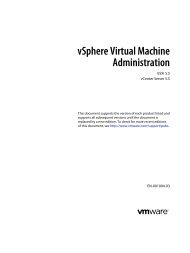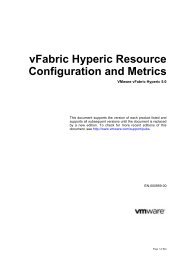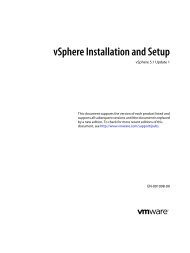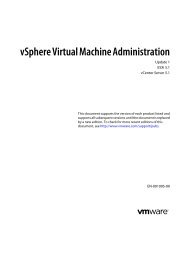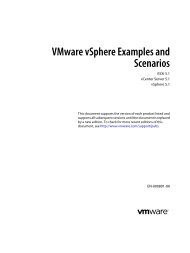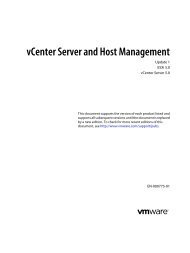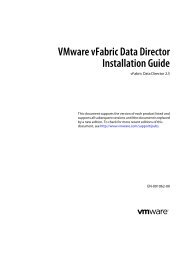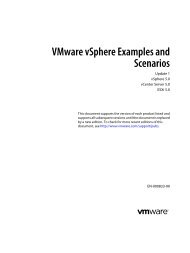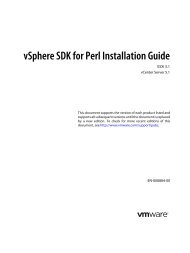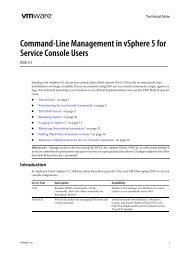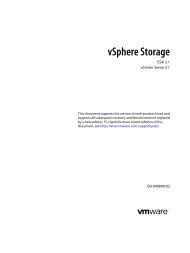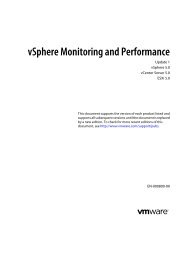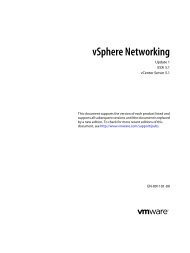vSphere SDK for Perl Programming Guide - Documentation - VMware
vSphere SDK for Perl Programming Guide - Documentation - VMware
vSphere SDK for Perl Programming Guide - Documentation - VMware
You also want an ePaper? Increase the reach of your titles
YUMPU automatically turns print PDFs into web optimized ePapers that Google loves.
<strong>vSphere</strong> <strong>SDK</strong> <strong>for</strong> <strong>Perl</strong> <strong>Programming</strong> <strong>Guide</strong><br />
Argument Description<br />
role (optional) Role that the object plays in the association class. The method filters the results<br />
according to the role.<br />
resultclassname (optional) Result class name, which must be present in the association. The method<br />
returns only those instances.<br />
resultrole (optional) Role that the result class plays in this instance. The method returns the results<br />
based on resultrole.<br />
includeresult (optional) Further filters query results based on properties of the instances. You can pass<br />
in properties as a name‐value hash, then pass in a reference to this hash in the<br />
includeresult named argument.<br />
namespace Default CIM namespace. Default is root/cimv2.<br />
If the namespace is not root/cimv2, you must pass in the namespace of the<br />
class in this argument.<br />
Example<br />
$client->EnumerateAssociatedInstances(<br />
EnumerateAssociatedInstanceNames<br />
class_name => 'CIM_Foo',<br />
selectors => \%hash;<br />
associationclassname => 'CIM_Bar', #optional<br />
role => 'CIM_Baz', #optional<br />
resultclassname => 'CIM_Bat', #optional<br />
resultrole => 'CIM_Quux', #optional<br />
includeresult => \%hash, #optional<br />
namespace => 'root/cimv2' #optional<br />
Returns objects with only the key values of the associated instance populated. The usage is the same as <strong>for</strong><br />
EnumerateAssociatedInstances.<br />
EnumerateAssociationInstances<br />
Returns objects containing association instances of which the class is a part. The usage is the same as <strong>for</strong><br />
EnumerateAssociatedInstances.<br />
EnumerateAssociationInstanceNames<br />
Returns objects containing key values of the association instances of which the class is a part. The usage is the<br />
same as <strong>for</strong> EnumerateAssociatedInstances.<br />
GetInstance<br />
Retrieves a particular instance of a class.<br />
Arguments<br />
Accepts the following named arguments:<br />
Argument Description<br />
class_name Name of the class whose instance you want to retrieve, passed as a string<br />
options Keys <strong>for</strong> the instance on which you want to per<strong>for</strong>m the GetInstance operation. The argument is<br />
passed as a reference to a hash containing the keys in name‐value pairs.<br />
namespace Default CIM namespace. Default is root/cimv2.<br />
If the namespace is not root/cimv2, you must pass in the namespace of the class in this argument.<br />
Returns<br />
Prints a fault string or returns the result in a hash.<br />
60 <strong>VMware</strong>, Inc.



